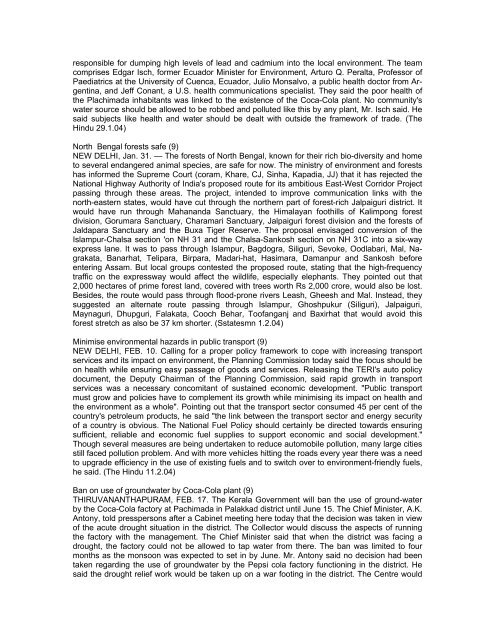ENVIRONMENT - 2004 - Indian Social Institute
ENVIRONMENT - 2004 - Indian Social Institute
ENVIRONMENT - 2004 - Indian Social Institute
Create successful ePaper yourself
Turn your PDF publications into a flip-book with our unique Google optimized e-Paper software.
esponsible for dumping high levels of lead and cadmium into the local environment. The team<br />
comprises Edgar Isch, former Ecuador Minister for Environment, Arturo Q. Peralta, Professor of<br />
Paediatrics at the University of Cuenca, Ecuador, Julio Monsalvo, a public health doctor from Argentina,<br />
and Jeff Conant, a U.S. health communications specialist. They said the poor health of<br />
the Plachimada inhabitants was linked to the existence of the Coca-Cola plant. No community's<br />
water source should be allowed to be robbed and polluted like this by any plant, Mr. Isch said. He<br />
said subjects like health and water should be dealt with outside the framework of trade. (The<br />
Hindu 29.1.04)<br />
North Bengal forests safe (9)<br />
NEW DELHI, Jan. 31. — The forests of North Bengal, known for their rich bio-diversity and home<br />
to several endangered animal species, are safe for now. The ministry of environment and forests<br />
has informed the Supreme Court (coram, Khare, CJ, Sinha, Kapadia, JJ) that it has rejected the<br />
National Highway Authority of India's proposed route for its ambitious East-West Corridor Project<br />
passing through these areas. The project, intended to improve communication links with the<br />
north-eastern states, would have cut through the northern part of forest-rich Jalpaiguri district. It<br />
would have run through Mahananda Sanctuary, the Himalayan foothills of Kalimpong forest<br />
division, Gorumara Sanctuary, Charamari Sanctuary, Jalpaiguri forest division and the forests of<br />
Jaldapara Sanctuary and the Buxa Tiger Reserve. The proposal envisaged conversion of the<br />
Islampur-Chalsa section 'on NH 31 and the Chalsa-Sankosh section on NH 31C into a six-way<br />
express lane. It was to pass through Islampur, Bagdogra, Siliguri, Sevoke, Oodlabari, Mal, Nagrakata,<br />
Banarhat, Telipara, Birpara, Madari-hat, Hasimara, Damanpur and Sankosh before<br />
entering Assam. But local groups contested the proposed route, stating that the high-frequency<br />
traffic on the expressway would affect the wildlife, especially elephants. They pointed out that<br />
2,000 hectares of prime forest land, covered with trees worth Rs 2,000 crore, would also be lost.<br />
Besides, the route would pass through flood-prone rivers Leash, Gheesh and Mal. Instead, they<br />
suggested an alternate route passing through Islampur, Ghoshpukur (Siliguri), Jalpaiguri,<br />
Maynaguri, Dhupguri, Falakata, Cooch Behar, Toofanganj and Baxirhat that would avoid this<br />
forest stretch as also be 37 km shorter. (Sstatesmn 1.2.04)<br />
Minimise environmental hazards in public transport (9)<br />
NEW DELHI, FEB. 10. Calling for a proper policy framework to cope with increasing transport<br />
services and its impact on environment, the Planning Commission today said the focus should be<br />
on health while ensuring easy passage of goods and services. Releasing the TERI's auto policy<br />
document, the Deputy Chairman of the Planning Commission, said rapid growth in transport<br />
services was a necessary concomitant of sustained economic development. "Public transport<br />
must grow and policies have to complement its growth while minimising its impact on health and<br />
the environment as a whole". Pointing out that the transport sector consumed 45 per cent of the<br />
country's petroleum products, he said "the link between the transport sector and energy security<br />
of a country is obvious. The National Fuel Policy should certainly be directed towards ensuring<br />
sufficient, reliable and economic fuel supplies to support economic and social development."<br />
Though several measures are being undertaken to reduce automobile pollution, many large cities<br />
still faced pollution problem. And with more vehicles hitting the roads every year there was a need<br />
to upgrade efficiency in the use of existing fuels and to switch over to environment-friendly fuels,<br />
he said. (The Hindu 11.2.04)<br />
Ban on use of groundwater by Coca-Cola plant (9)<br />
THIRUVANANTHAPURAM, FEB. 17. The Kerala Government will ban the use of ground-water<br />
by the Coca-Cola factory at Pachimada in Palakkad district until June 15. The Chief Minister, A.K.<br />
Antony, told presspersons after a Cabinet meeting here today that the decision was taken in view<br />
of the acute drought situation in the district. The Collector would discuss the aspects of running<br />
the factory with the management. The Chief Minister said that when the district was facing a<br />
drought, the factory could not be allowed to tap water from there. The ban was limited to four<br />
months as the monsoon was expected to set in by June. Mr. Antony said no decision had been<br />
taken regarding the use of groundwater by the Pepsi cola factory functioning in the district. He<br />
said the drought relief work would be taken up on a war footing in the district. The Centre would

















